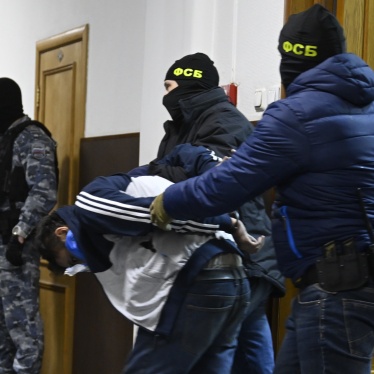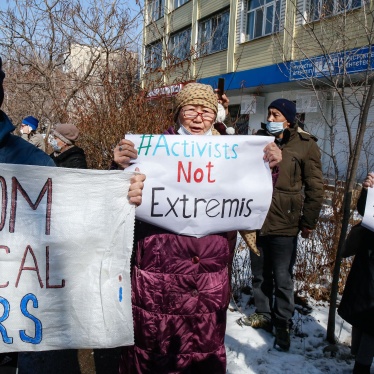Like an addict, France does not know how to quit its state of emergency even though it has become clear that maintaining it erodes the rule of law and fosters human rights abuses while not keeping the country safer. The February 22 report by the parliamentary commission tasked with monitoring the state of emergency provided yet another reminder that it no longer serves any meaningful purpose.
The commission president, Dominique Raimbourg, from the governing Socialist Party, noted that activity under the state of emergency has been “greatly reduced” since the last extension. His fellow commission member, Jean-Frédéric Poisson, from the main opposition party Les Republicains, noted that “time that passes erodes the efficiency and nature of the state of emergency.” A French commission of inquiry into the Paris attacks had already concluded back in July 2016 that the state of emergency had “limited impact” on improving security and any effect it may have had “quickly dissipated.”
Human Rights Watch’s own research has found repeated abuses against ordinary people during policing operations under emergency powers.
So why is France maintaining the state of emergency despite repeated warnings by its own oversight mechanisms?
It is mainly due to confusion by politicians about the purpose of a state of emergency. Many have said that it is justified by an ongoing terrorist risk. This was clearly displayed in December 2016 when Interior Minister Bruno Le Roux justified his request for a fifth extension by saying that “the terrorist threat was at its highest.” Under this reasoning, a state of emergency is needed as long as there is a high security risk.
This reasoning is dangerous on many levels. By suggesting that regular laws, procedures, and oversight mechanisms are not sufficient to counter threats, it weakens the premise of the rule of law and relegates it to a luxury for “normal” times. But it also sets the stage for the trap in which France finds itself. French leaders have implied that they will only lift the state of emergency when the security risk has subsided but since they can’t predict the risk of future terrorist attacks, they prefer to maintain it rather than pay a political price if a subsequent attack takes place.
So lifting the state of emergency becomes less dependent on security considerations and more on political calculations. This would explain why France’s latest extension was driven by the electoral calendar, punting the issue to the next president and legislature. Call it political procrastination, or perhaps more aptly, political cowardice.
This disconnect between its initial purpose and current raison d’être was captured nicely by Sébastien Pietrasanta, a parliamentarian and rapporteur for the commission investigating the state’s response to the November 2015 attacks, who recently noted that “the effect of the state of emergency is fading and yet we extend it…even though the link with terrorism is quite tenuous.”
I have seen this logic at play in the Middle East. Egypt and Syria, countries I have worked on for years, maintained their states of emergency for 31 and 48 years respectively. Every time the state of emergency was up for renewal, the country’s rulers argued that the risk was still there or that the timing was not right to lift it. France is not a tin-pot autocracy and its rulers are not despots, but there is a cautionary tale in these experiences.
It is time to reframe the debate in France. A continuing state of emergency should not be dependent on the existence of risk – an exogenous measure that cannot be controlled by political calculations. It should be restricted to situations where there is an exceptional need for exceptional measures at an exceptional moment. It may have been justified for a few days immediately after the November 2015 attacks as the country’s security forces were caught unprepared. But it should have been lifted as soon as the institutions resumed their normal functioning – regardless of whether the underlying security threat has been addressed.
The French government’s own website on the fight against terrorism noted in August 2016 that the government has “completed its legal arsenal and put in place an unprecedented reinforcement of its means in the police, justice, army and intelligence services.” France already has a raft of laws under the non-emergency regime that permit the authorities to investigate, detain, and prosecute terrorism suspects. Judicial controls in no way impede their effectiveness.
France needs to adopt a clear path out of the state of emergency. The parliamentary commission monitoring the state of emergency suggested in December setting an upper limit on the extension of a state of emergency but parliament ignored it and voted a fifth extension with almost no debate. Candidates in the upcoming presidential election have largely avoided talking about the issue, perpetuating the procrastination strategy by the political class, and journalists have not pushed them on the issue.
It is no longer enough to wait and hope that the security threat will simply vanish or that the future president or legislature will finally decide to tackle the issue. The debate about lifting the state of emergency should become a priority topic in this presidential election. Like any addict hoping to recover, France needs to start by recognizing the problem and begin a serious conversation on how to quit.









